外研高二选修8 Module 4 Which English?模块复习课件(73张)
文档属性
| 名称 | 外研高二选修8 Module 4 Which English?模块复习课件(73张) | 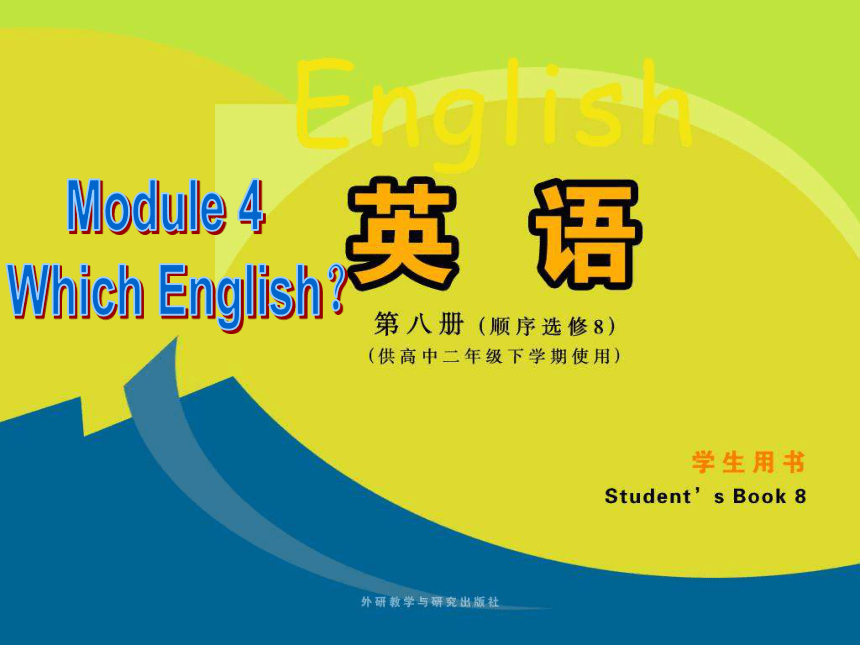 | |
| 格式 | zip | ||
| 文件大小 | 366.8KB | ||
| 资源类型 | 教案 | ||
| 版本资源 | 外研版 | ||
| 科目 | 英语 | ||
| 更新时间 | 2017-01-18 19:58:22 | ||
图片预览

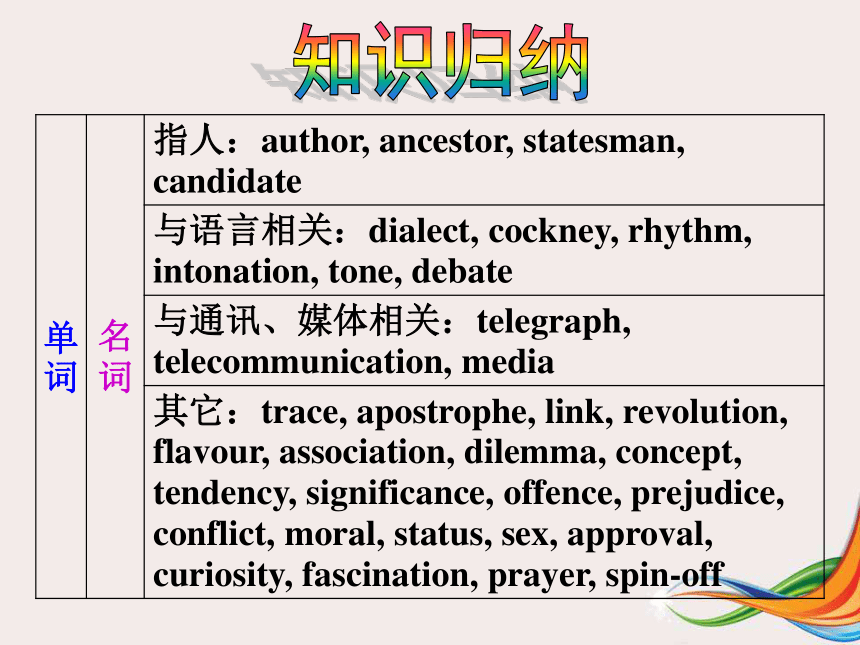
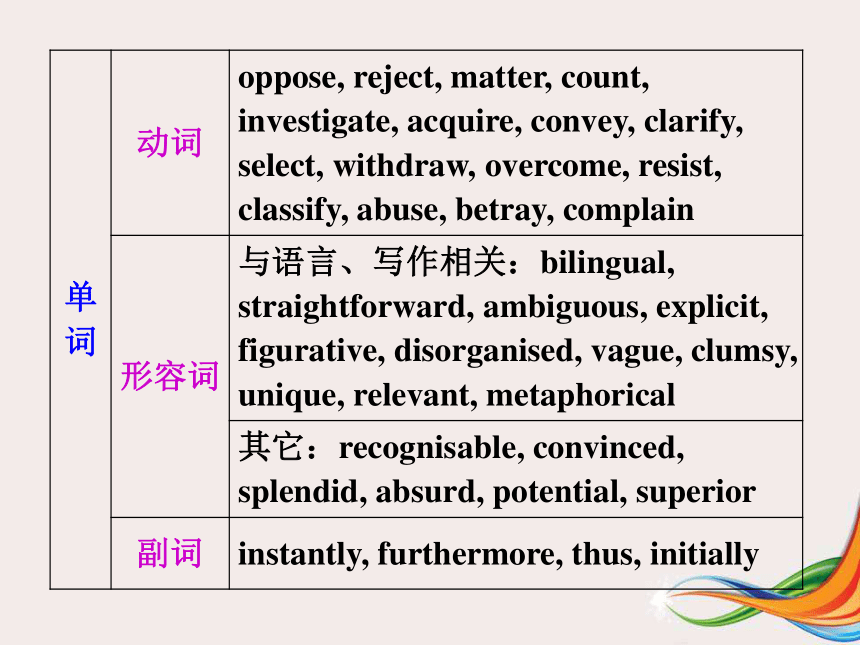
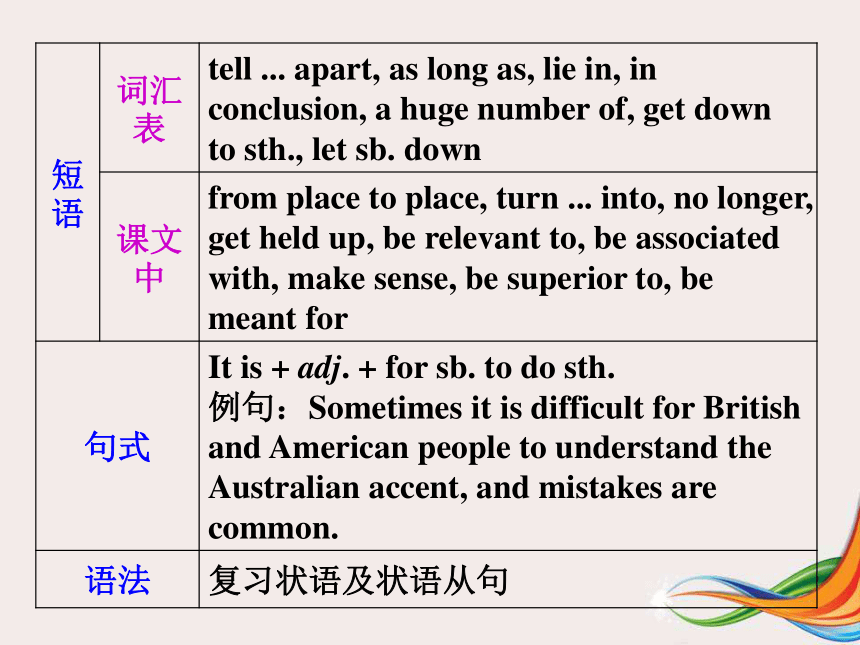
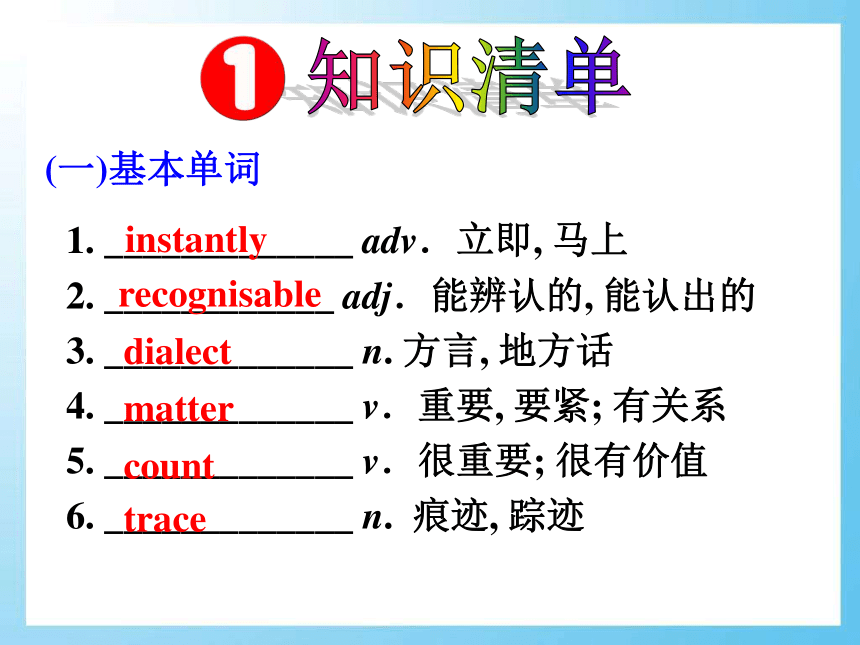


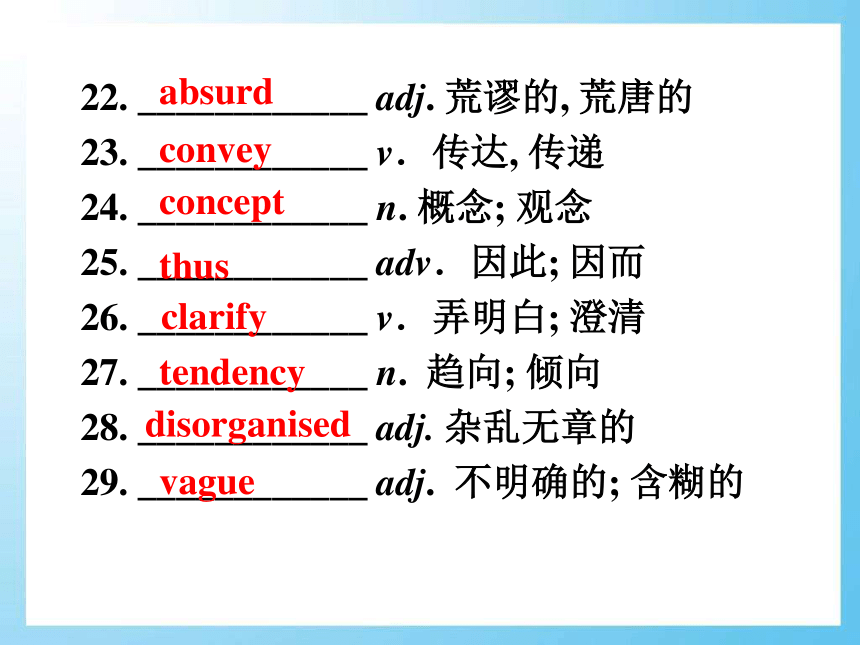


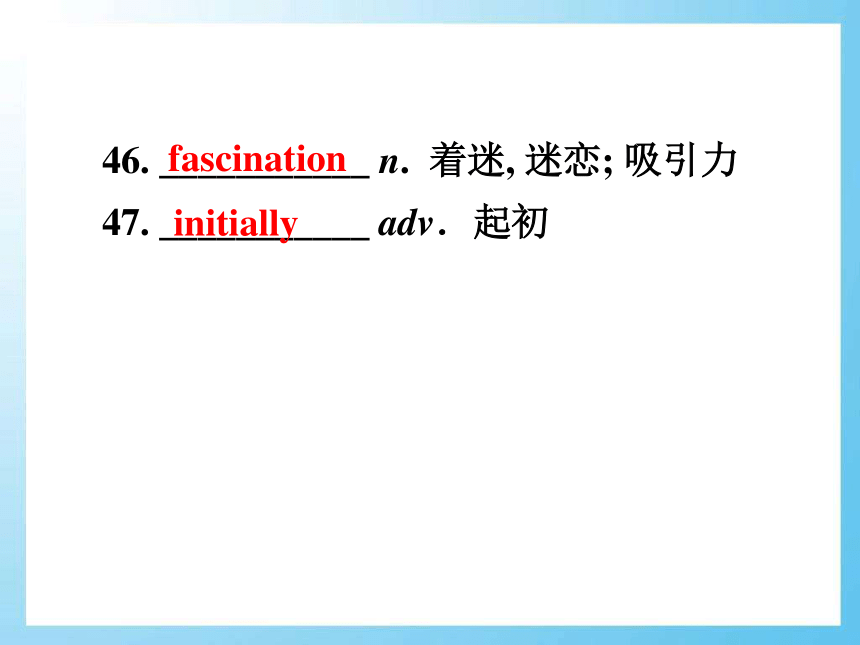
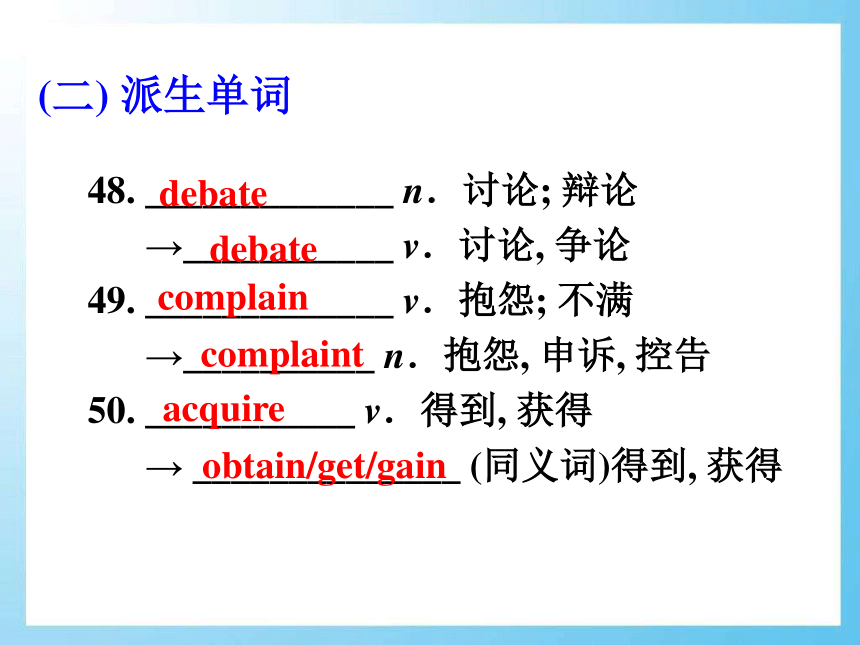
文档简介
课件73张PPT。Module 4
Which English?知识归纳知识清单(一)基本单词1. _____________ adv.立即, 马上
2. ____________ adj.能辨认的, 能认出的
3. _____________ n. 方言, 地方话
4. _____________ v.重要, 要紧; 有关系
5. _____________ v.很重要; 很有价值
6. _____________ n. 痕迹, 踪迹instantlyrecognisabledialectmattercounttrace7. ___________ adj.独一无二的; 独特的
8. _____________ n.作家, 作者
9. _____________ n. 祖先, 前辈
10. ____________ n. 联系
11. ____________ n.革命
12. _____________ v.调查
13. ____________ n. 特点, 特色; 情调
14. ____________ adv. 此外, 而且uniqueauthorancestorrevolutioninvestigateflavourlinkfurthermore15. ____________ adj. 极好的; 优秀的
16. _______________ adj.简单的, 易懂的
17. ____________ n. 联系
18. ____________ adj.歧义的; 含糊的
19. ____________ n.进退两难的境地;
困难的抉择
20. ____________ adj. 清楚明白的;
易于理解的
21. ____________ adj. 有关的; 切题的straightforwardassociationambiguousdilemmaexplicitrelevantsplendid22. ____________ adj. 荒谬的, 荒唐的
23. ____________ v.传达, 传递
24. ____________ n. 概念; 观念
25. ____________ adv.因此; 因而
26. ____________ v.弄明白; 澄清
27. ____________ n. 趋向; 倾向
28. ____________ adj. 杂乱无章的
29. ____________ adj. 不明确的; 含糊的conveyconceptthusclarifytendencydisorganisedvagueabsurd30. ____________ adj. 笨拙的
31. ____________ v.挑选, 选择
32. ____________ v. 收回; 撤销
33. ____________ v.拒绝接受
34. ____________ adj.潜在的; 可能的
35. ____________ v. 辱骂; 恶语
36. ____________ n. 得罪; 使伤感情
37. ____________ v. 对……不忠selectwithdrawrejectpotentialabuseoffencebetrayclumsy38. ____________ v. 征服; 战胜
39. ____________ v.反对
40. ____________ n. 偏见; 歧视
41. ____________ n.抵触; 冲突
42. ____________ adj.更好的; 更强的
43. ____________ n. 地位
44. ____________ v. 将……分类
45. ____________ n. 好奇心opposeprejudiceconflictsuperiorstatusclassifycuriosityovercome46. ___________ n. 着迷, 迷恋; 吸引力
47. ___________ adv.起初initiallyfascination48. _____________ n.讨论; 辩论
→___________ v.讨论, 争论
49. _____________ v.抱怨; 不满
→__________ n.抱怨, 申诉, 控告
50. ___________ v.得到, 获得
→ ______________ (同义词)得到, 获得(二) 派生单词debatedebatecomplaincomplaint acquireobtain/get/gain51. __________ adj. 确信的, 信服的
→___________ adj. 令人信服的
→___________ vt. 使确信; 说服
52. ______________ n.意义; 含义
→___________ adj. 重大的, 重要的convincedconvincingconvincesignificancesignificant53. ____________ v.拒绝接受
→__________ n.排斥, 拒绝, 否定
→ _____________(同义词)拒绝, 否定
54. __________ v.反抗; 抵抗
→_____________ n.反抗, 抵抗力
55. __________ n.赞许; 赞成
→_________ vi.批准, 赞成rejectrejectionrefuse/declineresistresistanceapprovalapprove1. _______________ 区分开
2. _______________ 开始做
3. _________________ 对做某事感到好奇
4. ________________ 趋向于, 倾向
5. ________________与……冲突
6. ________________与……合作
7. ________________ 算出, 理解, 弄明白
8. ________________ 使某人失望(三) 短语tell...apartget down to sth.be curious to do sth.tend toconflict within association withfigure outlet sb. down9. ________________ 大量的
10.________________ 只要
11. _______________ 在于
12. _______________ 总之a huge number ofas long aslie inin conclusion1. debate n. 讨论, 争论, 辩论
【归纳】
hold a debate 举行辩论会
beyond debate 无可争辩
under debate 在辩论中核心要点(一) 单 词debate vi. & vt. 辩论, 讨论, 争论
【归纳】
debate about/on/over sth.with sb.
与某人争论……
debate sth. with sb.
与某人讨论某事
debate whether/what/how etc. to do sth.
讨论……(1) debate辩论的目的在于说服对方。
(2) argue指条理清晰地陈述赞成或反对的理由。
(3) discuss从不同的观点出发与某人讨论某事。debate, argue与discuss2. clarify vt. 澄清, 讲清楚, 阐明;
(加热)净化
【归纳】
clarify matters 澄清真相
clarify one’s remarks 把话说清楚
clarify one’s stand/position
阐明某人的立场
【拓展】
clarification n. 澄清
clarity n. 清澈, 透明3. complain vi. 抱怨; 不满; 发牢骚
【归纳】
complain (to sb.) about/of...
(向某人)抱怨……
complain (to sb.) that-clause
(向某人)抱怨……
complain to sb.
向某人申诉; 诉说……病痛【拓展】
complaint n.抱怨; 申诉; 投诉
make a complaint about/of/against
抱怨; 投诉
a letter of complaint 一封投诉信
can’t complain
[口]还算好(总体上还是满意的, 虽然有些
不如意)4. approval n.批准; 认可; 赞成; 同意
【归纳】
general approval 一致同意
with approval of 经……的批准
in approval 同意地, 支持地
give (one’s) approval 给予批准
meet with one’s approval 得到某人的赞
许, 得到某人的认可
【拓展】
approve v.批准, 赞成
approve of sb./sth. 赞成某人/事5. convinced adj. 确信的, 深信的
【归纳】
be convinced of .../ that-clause
相信……
【拓展】
convince vt. 使确信, 使信服
convince sb. of sth. 使某人相信…
convince sb. to do sth. 说服某人干某事6. matter v. 重要, 有关系, 要紧
n. 事情, 问题, 物质, 材料
What’s the matter? 怎么了?
【拓展】与matter相关的短语:
(as) a matter of course
(作为)理所当然的事
as a matter of fact 实际上, 不瞒你说
for that matter 就此而言in the matter of
在……方面
a matter of life and death
生死攸关的事, 成败的关键
no matter who / what / where ...
不论谁 / 什么 / 在哪里……7. oppose vt. 反抗, 反对
【归纳】
oppose (doing) sth. 反对干某事
be opposed to (doing) sth. 反对干某事
【拓展】
opposition n. 反对, 对立
meet with opposition 遭到反对
in opposition to sb. on sth.
在某事上与某人意见相反注意:
be opposed to中的to是介词, 不是不定式符号, 后加名词/代词或v.-ing形式, 不加to do, 其同义词组是be against和object to。8. significance n. 意义; 意味深长; 含义;
重要性; 显著性
【归纳】
of no/little significance 无关紧要的
historical significance 历史意义
of significance=significant
有意义的; 重要的
【拓展】
significant adj. 有意义的
signify vt. 表示; 表明; 意味着9. classify vt. 分类
【归纳】
classify...into... 把……分类
【拓展】
classification n. 分类; 等级; 类别
classified adj. 分类的; 机密的
classifiable adj. 可分类的; 可分等级的10. convey vt. 传达; 运送
【归纳】
convey sth. to sb.
向某人表达/传递某物
convey sb./sth. from A to B
把某人或某物从A地运送到B地
convey one’s feelings/meanings/message
表达某人的感情/意思/信息convey常指通过媒介传递、输送, 也常用来表示交流、传达(信息、情感)等。
transport主要限于人或有形物体, 往往是长距离的运输, 常指交通运输。
transmit指发送或传播某物, 特别是信号的传送、疾病的传播。convey, transport与transmit11. overcome vt. & vi. 战胜; 克服; 解决
overcome的过去式和过去分词分别为:
overcame, overcome。
【归纳】
overcome sth./sb. 打败某人/某物;
克服……
be overcome by... 被……制服;
……使无能为力overcome 指“战胜”、“压倒”、“克服”, 尤指“感情”而言。
defeat 指“赢得胜利”, 尤其指“军事上的胜利”。
conquer 指“征服”、“战胜”, “占领”, 特别指“获得对人、物或感情的控制”。overcome, defeat与conquer【拓展】
overcome difficulties 克服困难
overcome a bad habit 克服恶习
defeat the enemy
打败敌人(也可以说 overcome the enemy)
conquer nature/the world
征服自然/世界1. tell...apart 把……区分开
【拓展】
tell A and B apart=tell A from B=
tell the difference(s) between A and B
把A与B区分开
tell+that.../wh- 辨别, 识别(二) 短语【联想】
tell sb. about/of sth. 告诉某人有关某事
tell a lie/lies 撒谎
to tell the truth 说实话2. let sb. / sth. down 使某人失望, 辜负;
(使)略逊一筹, 美中不足
【拓展】
let alone 更不必说
let off 宽恕; 开(枪), 放(炮、烟火等);
让……下车
let out 放走, 释放; 泄露, 放出;
放宽, 放大(衣服)
let go 放开, 松手let sb./sth. in/into 让……进来,
放……进来
注意:
let...alone=let...be/leave...alone不干涉; 对……置之不理;
而let alone是“……更不必说”, 需作插入语。 3. get down to (doing) sth. 开始, 着手
【拓展】
set about doing sth. 着手做某事
go about doing sth.着手做某事
set out to do sth. 着手做某事
get down to doing sth. 着手做某事
get down (从高处)下来; 取下, 放下;
使(人)气馁get in one’s way
挡住某人的路; 妨碍某人
get into trouble 陷入困境
get together 相聚; 聚集
get-together n. 聚会; 联欢会
get on/along with sb. 与某人相处I. 根据本模块所学单词及提示写出所缺单词的正确形式。
1. She __________ (抱怨) that no one had been at the airport to meet her.
2. There is a(n) _________ (倾向) for unemployment to rise in the summer.tendency? complained?3. Please c_______ my good wishes to your mother.
4. Eventually she managed to _________ (克服) her shyness in class.
5. If the enemies continue to r_____, wipe them out.
6. The discovery of the new drug is of great ___________ (意义) to people suffering from heart problems.overcome conveysignificanceresist? ?II. 用适当的介词或副词填空。
1. What experience do you have that is relevant ____ this position?
2. Most new cars look so similar that it’s impossible to tell them _______.
3. The cure for stress lies _____ learning to relax.
4. It’s time you got down ____ some reading or the other students will leave you behind.totoapartinIII. 补全句子
1. Your failure in the final exam _______ (在于) the fact that you didn’t take your study seriously.
2. Tom, don’t waste time. You have turned 18 and it’s time to ____________ (开始认真对待) business. lies inget down to4. In order not to ___________________ (让我父母失望), I work hard every day.
5. It’s almost impossible to _____ the twins ________ (把……区分开).
6. _____________ (总之), I would like to thank all those who have worked so hard to bring about this result.let my parents downtellapart?In conclusion 1. Not all idioms have been common for many years.
并非所有的习语很多年都常见。
not all...意为“并非所有的……都”, 是部分否定。not的位置比较灵活, 可置于句首, 也可放在句中。(三) 句式e.g. Not all the people present agreed with you.
=All the people present didn’t agree with you.
【拓展】
1) 与not连用构成部分否定的词有:
all, everyone, everywhere, both,
everybody, always, every, everything,
altogether(全体), entirely(全部地),
wholly(全部地)2) 表示全部否定的词有:none, nobody, no one, neither, never, nothing, nowhere等。2. The quality of someone’s voice and their choice of words make a person instantly recognizable, even though you can't see him or her.
一个人的音质及措词都能让这个人立即被辨认出来, 即使你看不见是谁。
even if/though表“即使”, 引导让步状语从句。从句中可用陈述语气或虚拟语气。使用陈述语气时, 可用一般现在时代替将来时。3. In this sense everybody’s use of language—whether English, Chinese, or any other—is different.
从这种意义上来说, 每个人对语言的使用--不管是英语、汉语或者任何其他语言--都是不一样的。
whether English, Chinese, or any other 在句中作插入语, 用来对所要表达的内容进行解释或补充。插入语可用破折号分开, 也可用逗号隔开。语法时间、地点、原因、目的、方式状语从句高考考点解读考点一、时间状语从句
【真题再现】
1. The meaning of the word “nice” changed a few
times _____ it finally came to include the sense “pleasant.”?? (2014年安徽卷单项填空)
A. before??????? B. after?????? C. since?????? D. while2. It was the middle of the night _____ my father woke me up and told me to watch the football game.??? (2014年江西卷单项填空)
A. that???????? B. as?????? C. which????? D. when
【考点解读】时间状语从句表示时间,其所
用的关联词有before, when, as, after, once,
since, till, until, whenever, while, as long as,
as soon as等。考点二、地点状语从句
【真题再现】
Half an hour later, Lucy still couldn’t get a taxi _____ the bus had dropped her. (2014年重庆卷单项填空)
A. until????? B. when?? C. although????D. where
【考点解读】地点状语从句表示地点,其所用的关联词有where, wherever, anywhere等。考点三、原因状语从句
【真题再现】
1. Mark needs to learn Chinese _____ his company is opening a branch in Beijing. (2013年山东卷单项填空)
A. unless?????? B. until ?????C. although?? ?? D. since
2. —Coach, can I continue with the raining??????????????
—Sorry, you can’t _____ you haven’t recovered from the knee injury.? (2012年重庆卷单项填空)
A. until??????? B. before???????? C. as???????? D. unless
【考点解读】原因状语从句表示原因或理由,其所
用的关联词有because, as, since等。考点四、目的状语从句
【真题再现】
Cathy had quit her job when her son was born _____ she could stay home and raise her family. (2014年浙江卷单项填空)
A. now that????? B. as if???? C. only if???? D. so that
【考点解读】目的状语从句表示目的,其所用的关联词有in case, so that, in order that等。考点五、方式状语从句
【真题再现】
Jack wasn’t saying anything, but the teacher smiled at him _____ he had done something very clever. (2011年湖南卷单项填空)
A. as if??????? B. in case????? C. while?????? D. though
【考点解读】方式状语从句表示动作的方式,其所用的关联词有as, as if, as though等。选用正确的内容完成下面短文。
Life is very much like a garden. You should avoid the following things 1. ________ (so that / as if) you can get a successful garden to grow.
The law of weeds
Weeds will grow for sure 2. ______ (once / until) you don’t plant flowers. In other words, onceso that??3. ________ (since / when) your thoughts and actions are not directed towards success, they will bring you 4. ________ (when / where) you don’t want to go.
A half-grown garden
What will your garden look like 5. _____ (as / if) you only spend a few hours a week gardening? Some roses might grow here and there, but the success of your garden will notif?whenwherebe guaranteed. Most people want to have more success in life but they don’t want to actually work for it. They usually fail 6. ________ (while / because) they put comfort before results.
Always digging up your seeds
You need to be patient 7. ____________ (in order that / as long as) you can see the results you want. 8. ______ (When/While) you plant aWhenbecausein order that??flower, you believe it will grow. You don’t dig it up every day to see how much it has grown. Patience could be your missing link to success.写作【写作任务】
?????? 最近有很多像“no zuo no die(不作死就不会死)”的网络流行语(network buzzwords)被录入美国在线词典(Urban Dictionary),这引发了人们的争论。请你根据所给提示,用英语写一篇短文,并发表在某英文报上。如何写介绍不同观点的议论文注意:1. 词数120左右;
2. 可适当增加细节,以使行文连贯。【写作指导】
审题定调
???本写作要求介绍人们对同一事件的不同看法,属于议论文。
布局谋篇
本写作可分为三部分:
第一部分:提出议题或指出现象;
第二部分:介绍各方的观点;
第三部分:表明自己的观点。常用表达
Recently more and more network buzzwords like ... have entered the Urban Dictionary.
Different people have different opinions about ...
Those who are for this think ...
On the one hand, ... On the other hand, ...
However, those who are against it think ...
As far as I’m concerned, ...【参考范文】
Recently more and more network buzzwords like “no zuo no die”, which are called Chinglish, have entered the Urban Dictionary. Different people have different opinions about it.
Those who are for this think these network buzzwords enrich English. On the one hand, they are vivid and easy to understand and thus they are easier to learn. On the other hand, the use ofthese words indicates that Chinese is becoming more and more important in the world. However, those who are against it think these words influence normal English studies and destroy the independence of languages.
As far as I’m concerned, these network buzzwords make human languages more colorful. But they shouldn’t be used in documents or test papers and any other formal situations.巩固练习阅读下面材料, 在空白处填入适当的内容(不多于3个单词)或括号内单词的正确形式。
At some point, learners of English will start thinking about taking a test. There are 1. ____ huge number of tests out there, but two companies 2. ________ dominate Englishthat?a language learning worldwide are the University of Cambridge and the Educational Testing Service or ETS. The University of Cambridge is based in Cambridge, UK. IELTS (International English Testing System), FCE (First Certificate in English), CAE (Certificate of Advanced English) and BULATS (Business Language Testing Service) are all University of Cambridge tests. They have a(n) 3. ________variety(vary) of question types, including multiple choice, gap-fill and matching and so on. ETS is based in Princeton, USA. TOEFL (Test of English as a Foreign Language) and TOEIC (Test of English as International Communication) are ETS tests. They concentrate 4. ______ US English and computer-based English and most questions are multiple choice.???????? on Before selecting which English test to take, learners should 5. ________ (initial) ask what they need to take the test for. To get into a university, TOEFL is often 6. _________ (require) by universities in the US and Canada, IELTS in Australia and New Zealand and FCE and CAE in European Community countries. FCE and CAE are also good for those who are just looking 7. ___________to improve?initially?required(improve) their general English skills. And BULATS is, of course, a good test for those just wishing to focus 8. ____ English in the workplace.on
Which English?知识归纳知识清单(一)基本单词1. _____________ adv.立即, 马上
2. ____________ adj.能辨认的, 能认出的
3. _____________ n. 方言, 地方话
4. _____________ v.重要, 要紧; 有关系
5. _____________ v.很重要; 很有价值
6. _____________ n. 痕迹, 踪迹instantlyrecognisabledialectmattercounttrace7. ___________ adj.独一无二的; 独特的
8. _____________ n.作家, 作者
9. _____________ n. 祖先, 前辈
10. ____________ n. 联系
11. ____________ n.革命
12. _____________ v.调查
13. ____________ n. 特点, 特色; 情调
14. ____________ adv. 此外, 而且uniqueauthorancestorrevolutioninvestigateflavourlinkfurthermore15. ____________ adj. 极好的; 优秀的
16. _______________ adj.简单的, 易懂的
17. ____________ n. 联系
18. ____________ adj.歧义的; 含糊的
19. ____________ n.进退两难的境地;
困难的抉择
20. ____________ adj. 清楚明白的;
易于理解的
21. ____________ adj. 有关的; 切题的straightforwardassociationambiguousdilemmaexplicitrelevantsplendid22. ____________ adj. 荒谬的, 荒唐的
23. ____________ v.传达, 传递
24. ____________ n. 概念; 观念
25. ____________ adv.因此; 因而
26. ____________ v.弄明白; 澄清
27. ____________ n. 趋向; 倾向
28. ____________ adj. 杂乱无章的
29. ____________ adj. 不明确的; 含糊的conveyconceptthusclarifytendencydisorganisedvagueabsurd30. ____________ adj. 笨拙的
31. ____________ v.挑选, 选择
32. ____________ v. 收回; 撤销
33. ____________ v.拒绝接受
34. ____________ adj.潜在的; 可能的
35. ____________ v. 辱骂; 恶语
36. ____________ n. 得罪; 使伤感情
37. ____________ v. 对……不忠selectwithdrawrejectpotentialabuseoffencebetrayclumsy38. ____________ v. 征服; 战胜
39. ____________ v.反对
40. ____________ n. 偏见; 歧视
41. ____________ n.抵触; 冲突
42. ____________ adj.更好的; 更强的
43. ____________ n. 地位
44. ____________ v. 将……分类
45. ____________ n. 好奇心opposeprejudiceconflictsuperiorstatusclassifycuriosityovercome46. ___________ n. 着迷, 迷恋; 吸引力
47. ___________ adv.起初initiallyfascination48. _____________ n.讨论; 辩论
→___________ v.讨论, 争论
49. _____________ v.抱怨; 不满
→__________ n.抱怨, 申诉, 控告
50. ___________ v.得到, 获得
→ ______________ (同义词)得到, 获得(二) 派生单词debatedebatecomplaincomplaint acquireobtain/get/gain51. __________ adj. 确信的, 信服的
→___________ adj. 令人信服的
→___________ vt. 使确信; 说服
52. ______________ n.意义; 含义
→___________ adj. 重大的, 重要的convincedconvincingconvincesignificancesignificant53. ____________ v.拒绝接受
→__________ n.排斥, 拒绝, 否定
→ _____________(同义词)拒绝, 否定
54. __________ v.反抗; 抵抗
→_____________ n.反抗, 抵抗力
55. __________ n.赞许; 赞成
→_________ vi.批准, 赞成rejectrejectionrefuse/declineresistresistanceapprovalapprove1. _______________ 区分开
2. _______________ 开始做
3. _________________ 对做某事感到好奇
4. ________________ 趋向于, 倾向
5. ________________与……冲突
6. ________________与……合作
7. ________________ 算出, 理解, 弄明白
8. ________________ 使某人失望(三) 短语tell...apartget down to sth.be curious to do sth.tend toconflict within association withfigure outlet sb. down9. ________________ 大量的
10.________________ 只要
11. _______________ 在于
12. _______________ 总之a huge number ofas long aslie inin conclusion1. debate n. 讨论, 争论, 辩论
【归纳】
hold a debate 举行辩论会
beyond debate 无可争辩
under debate 在辩论中核心要点(一) 单 词debate vi. & vt. 辩论, 讨论, 争论
【归纳】
debate about/on/over sth.with sb.
与某人争论……
debate sth. with sb.
与某人讨论某事
debate whether/what/how etc. to do sth.
讨论……(1) debate辩论的目的在于说服对方。
(2) argue指条理清晰地陈述赞成或反对的理由。
(3) discuss从不同的观点出发与某人讨论某事。debate, argue与discuss2. clarify vt. 澄清, 讲清楚, 阐明;
(加热)净化
【归纳】
clarify matters 澄清真相
clarify one’s remarks 把话说清楚
clarify one’s stand/position
阐明某人的立场
【拓展】
clarification n. 澄清
clarity n. 清澈, 透明3. complain vi. 抱怨; 不满; 发牢骚
【归纳】
complain (to sb.) about/of...
(向某人)抱怨……
complain (to sb.) that-clause
(向某人)抱怨……
complain to sb.
向某人申诉; 诉说……病痛【拓展】
complaint n.抱怨; 申诉; 投诉
make a complaint about/of/against
抱怨; 投诉
a letter of complaint 一封投诉信
can’t complain
[口]还算好(总体上还是满意的, 虽然有些
不如意)4. approval n.批准; 认可; 赞成; 同意
【归纳】
general approval 一致同意
with approval of 经……的批准
in approval 同意地, 支持地
give (one’s) approval 给予批准
meet with one’s approval 得到某人的赞
许, 得到某人的认可
【拓展】
approve v.批准, 赞成
approve of sb./sth. 赞成某人/事5. convinced adj. 确信的, 深信的
【归纳】
be convinced of .../ that-clause
相信……
【拓展】
convince vt. 使确信, 使信服
convince sb. of sth. 使某人相信…
convince sb. to do sth. 说服某人干某事6. matter v. 重要, 有关系, 要紧
n. 事情, 问题, 物质, 材料
What’s the matter? 怎么了?
【拓展】与matter相关的短语:
(as) a matter of course
(作为)理所当然的事
as a matter of fact 实际上, 不瞒你说
for that matter 就此而言in the matter of
在……方面
a matter of life and death
生死攸关的事, 成败的关键
no matter who / what / where ...
不论谁 / 什么 / 在哪里……7. oppose vt. 反抗, 反对
【归纳】
oppose (doing) sth. 反对干某事
be opposed to (doing) sth. 反对干某事
【拓展】
opposition n. 反对, 对立
meet with opposition 遭到反对
in opposition to sb. on sth.
在某事上与某人意见相反注意:
be opposed to中的to是介词, 不是不定式符号, 后加名词/代词或v.-ing形式, 不加to do, 其同义词组是be against和object to。8. significance n. 意义; 意味深长; 含义;
重要性; 显著性
【归纳】
of no/little significance 无关紧要的
historical significance 历史意义
of significance=significant
有意义的; 重要的
【拓展】
significant adj. 有意义的
signify vt. 表示; 表明; 意味着9. classify vt. 分类
【归纳】
classify...into... 把……分类
【拓展】
classification n. 分类; 等级; 类别
classified adj. 分类的; 机密的
classifiable adj. 可分类的; 可分等级的10. convey vt. 传达; 运送
【归纳】
convey sth. to sb.
向某人表达/传递某物
convey sb./sth. from A to B
把某人或某物从A地运送到B地
convey one’s feelings/meanings/message
表达某人的感情/意思/信息convey常指通过媒介传递、输送, 也常用来表示交流、传达(信息、情感)等。
transport主要限于人或有形物体, 往往是长距离的运输, 常指交通运输。
transmit指发送或传播某物, 特别是信号的传送、疾病的传播。convey, transport与transmit11. overcome vt. & vi. 战胜; 克服; 解决
overcome的过去式和过去分词分别为:
overcame, overcome。
【归纳】
overcome sth./sb. 打败某人/某物;
克服……
be overcome by... 被……制服;
……使无能为力overcome 指“战胜”、“压倒”、“克服”, 尤指“感情”而言。
defeat 指“赢得胜利”, 尤其指“军事上的胜利”。
conquer 指“征服”、“战胜”, “占领”, 特别指“获得对人、物或感情的控制”。overcome, defeat与conquer【拓展】
overcome difficulties 克服困难
overcome a bad habit 克服恶习
defeat the enemy
打败敌人(也可以说 overcome the enemy)
conquer nature/the world
征服自然/世界1. tell...apart 把……区分开
【拓展】
tell A and B apart=tell A from B=
tell the difference(s) between A and B
把A与B区分开
tell+that.../wh- 辨别, 识别(二) 短语【联想】
tell sb. about/of sth. 告诉某人有关某事
tell a lie/lies 撒谎
to tell the truth 说实话2. let sb. / sth. down 使某人失望, 辜负;
(使)略逊一筹, 美中不足
【拓展】
let alone 更不必说
let off 宽恕; 开(枪), 放(炮、烟火等);
让……下车
let out 放走, 释放; 泄露, 放出;
放宽, 放大(衣服)
let go 放开, 松手let sb./sth. in/into 让……进来,
放……进来
注意:
let...alone=let...be/leave...alone不干涉; 对……置之不理;
而let alone是“……更不必说”, 需作插入语。 3. get down to (doing) sth. 开始, 着手
【拓展】
set about doing sth. 着手做某事
go about doing sth.着手做某事
set out to do sth. 着手做某事
get down to doing sth. 着手做某事
get down (从高处)下来; 取下, 放下;
使(人)气馁get in one’s way
挡住某人的路; 妨碍某人
get into trouble 陷入困境
get together 相聚; 聚集
get-together n. 聚会; 联欢会
get on/along with sb. 与某人相处I. 根据本模块所学单词及提示写出所缺单词的正确形式。
1. She __________ (抱怨) that no one had been at the airport to meet her.
2. There is a(n) _________ (倾向) for unemployment to rise in the summer.tendency? complained?3. Please c_______ my good wishes to your mother.
4. Eventually she managed to _________ (克服) her shyness in class.
5. If the enemies continue to r_____, wipe them out.
6. The discovery of the new drug is of great ___________ (意义) to people suffering from heart problems.overcome conveysignificanceresist? ?II. 用适当的介词或副词填空。
1. What experience do you have that is relevant ____ this position?
2. Most new cars look so similar that it’s impossible to tell them _______.
3. The cure for stress lies _____ learning to relax.
4. It’s time you got down ____ some reading or the other students will leave you behind.totoapartinIII. 补全句子
1. Your failure in the final exam _______ (在于) the fact that you didn’t take your study seriously.
2. Tom, don’t waste time. You have turned 18 and it’s time to ____________ (开始认真对待) business. lies inget down to4. In order not to ___________________ (让我父母失望), I work hard every day.
5. It’s almost impossible to _____ the twins ________ (把……区分开).
6. _____________ (总之), I would like to thank all those who have worked so hard to bring about this result.let my parents downtellapart?In conclusion 1. Not all idioms have been common for many years.
并非所有的习语很多年都常见。
not all...意为“并非所有的……都”, 是部分否定。not的位置比较灵活, 可置于句首, 也可放在句中。(三) 句式e.g. Not all the people present agreed with you.
=All the people present didn’t agree with you.
【拓展】
1) 与not连用构成部分否定的词有:
all, everyone, everywhere, both,
everybody, always, every, everything,
altogether(全体), entirely(全部地),
wholly(全部地)2) 表示全部否定的词有:none, nobody, no one, neither, never, nothing, nowhere等。2. The quality of someone’s voice and their choice of words make a person instantly recognizable, even though you can't see him or her.
一个人的音质及措词都能让这个人立即被辨认出来, 即使你看不见是谁。
even if/though表“即使”, 引导让步状语从句。从句中可用陈述语气或虚拟语气。使用陈述语气时, 可用一般现在时代替将来时。3. In this sense everybody’s use of language—whether English, Chinese, or any other—is different.
从这种意义上来说, 每个人对语言的使用--不管是英语、汉语或者任何其他语言--都是不一样的。
whether English, Chinese, or any other 在句中作插入语, 用来对所要表达的内容进行解释或补充。插入语可用破折号分开, 也可用逗号隔开。语法时间、地点、原因、目的、方式状语从句高考考点解读考点一、时间状语从句
【真题再现】
1. The meaning of the word “nice” changed a few
times _____ it finally came to include the sense “pleasant.”?? (2014年安徽卷单项填空)
A. before??????? B. after?????? C. since?????? D. while2. It was the middle of the night _____ my father woke me up and told me to watch the football game.??? (2014年江西卷单项填空)
A. that???????? B. as?????? C. which????? D. when
【考点解读】时间状语从句表示时间,其所
用的关联词有before, when, as, after, once,
since, till, until, whenever, while, as long as,
as soon as等。考点二、地点状语从句
【真题再现】
Half an hour later, Lucy still couldn’t get a taxi _____ the bus had dropped her. (2014年重庆卷单项填空)
A. until????? B. when?? C. although????D. where
【考点解读】地点状语从句表示地点,其所用的关联词有where, wherever, anywhere等。考点三、原因状语从句
【真题再现】
1. Mark needs to learn Chinese _____ his company is opening a branch in Beijing. (2013年山东卷单项填空)
A. unless?????? B. until ?????C. although?? ?? D. since
2. —Coach, can I continue with the raining??????????????
—Sorry, you can’t _____ you haven’t recovered from the knee injury.? (2012年重庆卷单项填空)
A. until??????? B. before???????? C. as???????? D. unless
【考点解读】原因状语从句表示原因或理由,其所
用的关联词有because, as, since等。考点四、目的状语从句
【真题再现】
Cathy had quit her job when her son was born _____ she could stay home and raise her family. (2014年浙江卷单项填空)
A. now that????? B. as if???? C. only if???? D. so that
【考点解读】目的状语从句表示目的,其所用的关联词有in case, so that, in order that等。考点五、方式状语从句
【真题再现】
Jack wasn’t saying anything, but the teacher smiled at him _____ he had done something very clever. (2011年湖南卷单项填空)
A. as if??????? B. in case????? C. while?????? D. though
【考点解读】方式状语从句表示动作的方式,其所用的关联词有as, as if, as though等。选用正确的内容完成下面短文。
Life is very much like a garden. You should avoid the following things 1. ________ (so that / as if) you can get a successful garden to grow.
The law of weeds
Weeds will grow for sure 2. ______ (once / until) you don’t plant flowers. In other words, onceso that??3. ________ (since / when) your thoughts and actions are not directed towards success, they will bring you 4. ________ (when / where) you don’t want to go.
A half-grown garden
What will your garden look like 5. _____ (as / if) you only spend a few hours a week gardening? Some roses might grow here and there, but the success of your garden will notif?whenwherebe guaranteed. Most people want to have more success in life but they don’t want to actually work for it. They usually fail 6. ________ (while / because) they put comfort before results.
Always digging up your seeds
You need to be patient 7. ____________ (in order that / as long as) you can see the results you want. 8. ______ (When/While) you plant aWhenbecausein order that??flower, you believe it will grow. You don’t dig it up every day to see how much it has grown. Patience could be your missing link to success.写作【写作任务】
?????? 最近有很多像“no zuo no die(不作死就不会死)”的网络流行语(network buzzwords)被录入美国在线词典(Urban Dictionary),这引发了人们的争论。请你根据所给提示,用英语写一篇短文,并发表在某英文报上。如何写介绍不同观点的议论文注意:1. 词数120左右;
2. 可适当增加细节,以使行文连贯。【写作指导】
审题定调
???本写作要求介绍人们对同一事件的不同看法,属于议论文。
布局谋篇
本写作可分为三部分:
第一部分:提出议题或指出现象;
第二部分:介绍各方的观点;
第三部分:表明自己的观点。常用表达
Recently more and more network buzzwords like ... have entered the Urban Dictionary.
Different people have different opinions about ...
Those who are for this think ...
On the one hand, ... On the other hand, ...
However, those who are against it think ...
As far as I’m concerned, ...【参考范文】
Recently more and more network buzzwords like “no zuo no die”, which are called Chinglish, have entered the Urban Dictionary. Different people have different opinions about it.
Those who are for this think these network buzzwords enrich English. On the one hand, they are vivid and easy to understand and thus they are easier to learn. On the other hand, the use ofthese words indicates that Chinese is becoming more and more important in the world. However, those who are against it think these words influence normal English studies and destroy the independence of languages.
As far as I’m concerned, these network buzzwords make human languages more colorful. But they shouldn’t be used in documents or test papers and any other formal situations.巩固练习阅读下面材料, 在空白处填入适当的内容(不多于3个单词)或括号内单词的正确形式。
At some point, learners of English will start thinking about taking a test. There are 1. ____ huge number of tests out there, but two companies 2. ________ dominate Englishthat?a language learning worldwide are the University of Cambridge and the Educational Testing Service or ETS. The University of Cambridge is based in Cambridge, UK. IELTS (International English Testing System), FCE (First Certificate in English), CAE (Certificate of Advanced English) and BULATS (Business Language Testing Service) are all University of Cambridge tests. They have a(n) 3. ________variety(vary) of question types, including multiple choice, gap-fill and matching and so on. ETS is based in Princeton, USA. TOEFL (Test of English as a Foreign Language) and TOEIC (Test of English as International Communication) are ETS tests. They concentrate 4. ______ US English and computer-based English and most questions are multiple choice.???????? on Before selecting which English test to take, learners should 5. ________ (initial) ask what they need to take the test for. To get into a university, TOEFL is often 6. _________ (require) by universities in the US and Canada, IELTS in Australia and New Zealand and FCE and CAE in European Community countries. FCE and CAE are also good for those who are just looking 7. ___________to improve?initially?required(improve) their general English skills. And BULATS is, of course, a good test for those just wishing to focus 8. ____ English in the workplace.on
